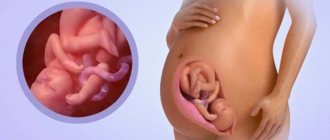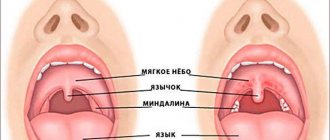Phlebeurysm
So, why does the vagina turn blue during pregnancy?
You will learn about this in this section of the article. We have already said that increased hydration and blood supply makes the vaginal mucosa swollen, loose and soft. It is also worth noting that during this period the mucous membrane is more susceptible to ruptures, which are accompanied by heavy bleeding. There have been cases where even minimal friction led to injury to the mucous membrane. Please note that in women in an interesting position, the connective tissue and muscular elements of the vagina undergo hyperplasia and hypertrophy. And as a result of increased blood supply to the genital organs, you can notice increased saturation of all layers of the woman’s vagina. This leads to the walls becoming more elastic.
The blue coloration of the genitals is the result of venous stagnation. An increase in the liquid part of the vaginal contents is facilitated by an intensification of the transudation process. Glycogen is deposited in the squamous epithelium, which has many layers. All these are comfortable conditions for the reproduction of lactobacilli. These bacteria produce lactic acid, keeping the pregnant woman's vagina acidic. This is necessary in order to prevent the spread of ascending infection.
Now in more detail about varicose veins in pregnant women. Let us immediately note that there are a number of factors that adversely affect the hemodynamics of the pelvic organs:
- number of births;
- age;
- working conditions.
It is highly not recommended to treat this problem yourself. As a rule, drug treatment for varicose veins is prescribed only by a phlebologist after the birth of a child.
Sensations in the vagina during pregnancy
The joyful event came, and with it came new worries. The expectant mother is sensitive to her feelings, although at times the discomfort may be clearly expressed. In what cases should you seek medical help?
Itching in the vagina
Such an unpleasant phenomenon as itching is a common cause of anxiety and worry in pregnant women. A woman reacts subtly to all irritants, and very severe itching can completely throw her off balance. Let’s try to figure out exactly how and where it “itches.” Both the labia majora and labia minora can itch. In addition to discomfort, this condition is also dangerous. Through scratches and abrasions formed at the site of scratching, a secondary infection can penetrate - the culprit for the appearance of cracks and even ulcers.
The causes of vaginal itching can be hidden both within the woman herself and can be from external irritants. The latter include:
- Clothes or underwear that cause discomfort when worn.
- Synthetic underwear, which does not allow air to pass through well and absorbs waste.
- Lack of sufficient intimate hygiene.
- Allergies to food, hygiene products or household chemicals.
Reasons that lie within the body and can cause vaginal itching during pregnancy include:
- Inflammatory diseases.
- Candidiasis.
- Decreased immunity, intestinal dysbiosis, resulting in the proliferation of pathogenic bacteria. Itching may be accompanied by an unpleasant odor (dysbacteriosis).
- Hepatitis, diabetes mellitus, and blood diseases can manifest as vaginal itching.
- Stress, excessive emotional stress.
If the itching does not go away within 3 days, you need to visit a doctor and undergo an examination. A hypoallergenic diet, elimination of spicy, pickled and spicy foods from the diet, walks, and chamomile baths will help alleviate unpleasant symptoms. Self-selection of medications for treatment can further aggravate the condition.
Pain in the vagina
During pregnancy, painful sensations of any location require special attention. And the vagina is no exception. They can vary in duration and intensity, be associated with other symptoms and occur independently.
When vaginal pain during pregnancy does not pose a threat:
- Unpleasant sensations radiating into the vagina can be caused by intestinal disorders. In this case, the pain is short-lived and occurs periodically at various intervals.
- Pain during intimate relationships is caused by insufficient lubrication or as a result of displacement of the pelvic organs (depending on the gestational age).
- Instability of the psycho-emotional state can also cause physical pain.
- Wearing an obstetric pessary may also cause discomfort and pain.
- The growth of the uterus and stretching of its muscles (in the first weeks of expecting a baby) can cause pain in the vaginal area. In the later stages, such sensations are a harbinger of an imminent meeting with the baby.
In addition, a woman may feel that her vagina hurts during pregnancy even in case of serious disorders:
- Wearing tight and narrow underwear and failure to comply with hygiene standards lead to changes in microflora and, as a result, pain and itching.
- Infections, inflammations that can affect, in addition to the vagina, the appendages, the cervix and the uterus itself. In this case, burning, unpleasant odor, and itching may occur.
- Ectopic pregnancy. If the pain intensifies and is stabbing in nature, this may be a signal that the fertilized egg is fixing in the fallopian tube. Painful sensations can also spread to the lumbar region.
- Cystitis. The disease is characterized by pain at the end of urination, urge without emptying, coupled with cutting pain in the vaginal area.
- Hypertonicity of the uterus - spotting may be present.
A urine test and smear test will help determine the cause of the discomfort so that treatment can be carried out if necessary.
Nagging pain
Pain of a pulling nature most often occurs when the elasticity of the vaginal tissues is impaired, or due to their excessive stretching. In addition, one should not exclude inflammation localized in the appendages and uterus - a similar symptom characterizes this pathology in women even in the absence of pregnancy. If you not only feel tightness in the vagina during pregnancy, but also experience cramping pain, you should immediately seek medical help, as termination of pregnancy is possible.
Stitching pains
Hormonal changes cause increased vaginal dryness in some women, which may result in a tingling sensation in the vagina during pregnancy. The occurrence of stabbing pain during intimacy can be triggered by an unsuccessfully chosen position - the uterus enlarges, the ligaments stretch, the bones move apart, so in the usual position a woman often experiences discomfort and pain. The following pathological conditions also cause similar discomfort:
- Vaginal infection. A pregnant woman is especially vulnerable to infections because her immune system is weakened. When diagnosing a disease, do not delay treatment. Aggressive therapy for pregnant women is contraindicated, so treatment can be longer, but gentle.
- Tubal pregnancy. Stitching pain combined with bleeding, dizziness, or pain in the abdomen, neck, shoulders, or back require medical supervision.
If the stabbing pains do not last long and are of low intensity, then most likely there is no cause for concern.
Burning in the vagina
The occurrence of a burning sensation in the vagina during pregnancy is by no means a harmless symptom. It may be caused by:
- Candidiasis (thrush). Infectious pathology is often accompanied by itching.
- Dysbacteriosis. Associated symptoms include unpleasant odor and itching.
- Chlamydia, genital herpes, inflammation of the vaginal mucosa.
- Inflammatory processes. In this case, the burning sensation may be accompanied by: discharge (including bloody), pain when urinating, pain.
- Risk of miscarriage. The burning turns into pain radiating to the lower back.
- Preeclampsia. In addition to burning, pain, nausea, headache, and diarrhea may be present.
The necessary diagnostic procedures and treatment are prescribed exclusively by a doctor.
Causes of pain
The vagina can hurt during pregnancy for several reasons. Very often, mild pain occurs in the early stages of pregnancy, indicating that the body is adapting to a new position. It is worth paying attention to the fact that these pains are not accompanied by any other unpleasant symptoms extending to the woman’s genital organs (including the vagina).
But severe pain accompanied by cramps and bleeding may indicate an ectopic pregnancy or miscarriage. In this case, it is necessary to urgently call emergency help.
Other reasons:
- infection (itching, burning, unpleasant discharge are possible; pregnant women often experience the following sexually transmitted infections - thrush, herpes, chlamydia, and so on);
- sexual contact;
- fears of the expectant mother (the cause of these pains is anxiety and an unbalanced psyche).
External factors
Itching and burning in the vagina in the early stages of pregnancy can occur due to changing hormonal levels. This, in turn, affects the microflora in the vagina. The production of lactic acid increases, which leads to an increase in the number of yeasts and other microbes for which such an environment is most suitable.
Another reason for such unpleasant sensations is wearing synthetic underwear, which blocks the flow of air into the intimate area. Such a vacuum also promotes the proliferation of pathogenic microflora.
Also, frequent use of various gels or soaps for washing disrupts the pH balance of the skin. Dry skin and mucous membranes of the genital organs also give a feeling of itching and burning.
Frequent douching also entails unpleasant consequences. Repeated use of this procedure to remove vaginal discharge changes the acidity and reduces the protective function of the mucosa.
Discharge
Vaginal discharge during pregnancy is completely normal. But, despite this, you need to monitor their quantity, color and smell. Some of them should be a reason to immediately go to the hospital. Now we will talk about what discharge is normal.
So, let's start with the fact that the vagina acts as a kind of channel to other organs of the woman’s reproductive system. The natural environment of the vagina is acidic, as it prevents the spread of bacteria. Allocations perform several functions:
- natural lubrication;
- cleansing the genital tract;
- preventing the development of infections.
If the acid balance is disturbed, the discharge changes consistency, smell and color.
There should not be a lot of discharge; sometimes increased secretion is observed (pregnancy, postpartum period, sexual intercourse). But this is quite normal and not a cause for alarm if they:
- have no odor;
- mucous in consistency;
- whitish or transparent in color;
- are not a source of irritation;
- almost invisible on underwear.
Reasons for changes in the consistency of discharge:
- stress;
- taking hormonal medications;
- sexual arousal;
- poor nutrition;
- diabetes;
- infection;
- incorrectly selected intimate hygiene product;
- taking antibiotics.
With the onset of the waiting period, the natural secretion of the vagina often changes.
During pregnancy, the discharge may increase, or vice versa - a woman may notice excessive dryness in the vagina during pregnancy. Despite the increased production of estrogen, in the ratio of it and progesterone, a predominance of gestagens is observed, the microflora changes, and the enlarged uterus exerts pressure. Together, all these factors often lead to vaginal dryness. This condition may be accompanied by:
- Itching and tingling.
- Burning.
- Painful intimate relationships.
- Frequent trips to the toilet.
If the discomfort is clearly pronounced and causes severe concern, additional examination may be necessary to exclude other factors causing dryness. If the cause of discomfort is a peculiarity of the position, the doctor may suggest moisturizers or antiseptics if necessary. Hormonal therapy is prescribed extremely rarely. In addition, drinking plenty of fluids, moderate exercise and proper nutrition are recommended. This simple recipe will help normalize the functioning of the body and hormonal levels.
If the discharge is present in the usual amount or a little more, it is important to pay attention to its color, consistency and smell.
- Thrush (candidiasis). The presence of this infection is characterized by a white secretion with a cheesy consistency, often accompanied by itching. The doctor selects a safe therapy. Ignoring treatment can be dangerous for the baby.
- Abundant clear discharge at the beginning of pregnancy is the norm, as it is caused by increased production of progesterone. Also, slightly whitish discharge without an unpleasant odor should not cause alarm.
- Yellow discharge is the most common companion to sexually transmitted infections. In this case, the doctor will take smears to confirm or refute the assumptions. At a later stage, it may be droplets of urine that leaks unnoticeably.
- Bloody discharge is a dangerous sign; seeking medical help is strictly indicated.
- An unpleasant odor from the vagina during pregnancy is one of the clearest signs of dysbacteriosis. A decrease in general immunity, hormonal changes, stress, and infectious and inflammatory diseases are predisposing factors for the occurrence of a pathological condition. Dysbacteriosis can also cause miscarriage. Antibacterial therapy, necessary to eliminate the disorder, is undesirable during pregnancy, so treatment during this period is aimed at maximizing the elimination of unpleasant symptoms.
Stitching pains
Now we will talk in more detail about the causes of stabbing pain in the vagina during pregnancy.
- Modification of the uterus. Tingling may occur around week 5, and sometimes a little later. At this moment, the muscles that support the uterus are stretched. This is especially noticeable when sneezing or coughing. If these tingling sensations are not strong and go away on their own within 30 minutes - 1 hour, then the expectant mother has no reason to worry.
- Excessive gas formation and constipation. These phenomena are quite common in pregnant women. All that needs to be done in this case is to adjust the diet. Avoid foods that cause gas and cause constipation. Include more fruits, berries and dairy products in your diet.
- Stitching and pulling pain in the vagina during pregnancy (in the later stages) may indicate that labor is approaching. Now the mother needs to calm down as much as possible, drive all fears and doubts out of her head, it is better to focus on a quick meeting with the long-awaited baby.
- Hypertonicity of the uterus can be manifested by stabbing and pulling pains, accompanied by copious discharge (including bloody). You need to urgently go to your doctor.
Possible diseases
Itching and burning in the vagina during pregnancy may indicate the presence of genitourinary infections. These include cystitis, urethritis, ureaplasmosis, etc. Unpleasant sensations arise due to the fact that the inflammatory process affects the urethra. The reasons for this are hypothermia or, on the contrary, overheating of the intimate area with the subsequent penetration of pathogenic microorganisms there.
The most common disease, which is accompanied by itching and burning of the genitals, is candidiasis, commonly known as thrush. This is due to fungi of the genus Candida. This disease must be treated, otherwise the child may become infected during childbirth or the mucous membrane may be damaged.
The active development of opportunistic organisms in the vaginal microflora can lead to bacterial vaginosis. The most obvious symptoms are severe itching and a fishy smell to the discharge. This can be caused by stress, the use of antibacterial drugs, poor nutrition and poor environment.
If itching and burning are accompanied by characteristic blistering rashes on the genitals or mucous membranes, then this indicates the presence of genital herpes. Self-medication in this case is contraindicated.
The risk of contracting sexually transmitted diseases in pregnant women is extremely high. Many STDs are usually asymptomatic, but due to weakened immunity in pregnant women, they develop obvious manifestations.
Unpleasant sensations in the intimate area can also cause parasitic diseases. If helminth infection is confirmed, the specialist will prescribe medications that are safe for you and your baby.
Atypical diseases that can cause itching and burning in the vagina during pregnancy are diabetes in the mother and problems with her liver or thyroid gland.
Nagging pain
If you feel nagging pain in the vagina during pregnancy, this may indicate some problem with the genitals, for example:
- inflammation of the appendages;
- adnexitis;
- inflammation of the uterus;
- ovarian cyst.
If during pregnancy you feel nagging, but not severe pain, and there is no discharge from the vagina, then you can tell your gynecologist about it. Perhaps he will prescribe you an antispasmodic drug. But if we are talking about increasing cramping pain, then urgent hospitalization of the patient is necessary, because this is a sign of the onset of labor, and if the time for the birth of a child has not yet come, a premature termination of pregnancy.
Treatment
Regardless of the identified disease, discomfort in the intimate area is often treated symptomatically. Treatment of burning sensation in the vagina during pregnancy, especially in the second and third trimester, is carried out using the following drugs:
- "Livarol" in the form of suppositories eliminates itching and burning, regardless of the reasons for its occurrence.
- "Clotrimazole" in the form of an ointment is used when a fungal infection is detected. The entire line of this drug is well used for the treatment of thrush.
- "Hexicon" in the form of suppositories is also prescribed for fungal pathologies and sexually transmitted diseases.
It should be recalled once again that self-administration of any medications during pregnancy is contraindicated. By these actions you can disrupt the development of your child and the normal course of pregnancy, even leading to spontaneous abortion.
Cutting pains
Cutting pain in the vagina during pregnancy may be signs of complications or a normal phenomenon in this position. It all depends on the intensity and accompanying symptoms. For example, cutting pain, which is erratic and not intense, may indicate the growth of the uterus and its muscle layer. Also, cutting pain may indicate the presence of a disease called cystitis. Then it is necessary to pass all tests and undergo a course of antibacterial treatment.
In addition, pay attention to the discharge. Cutting pain and spotting in early pregnancy may indicate an ectopic pregnancy or spontaneous miscarriage. At later stages, these symptoms may indicate placental abruption and premature birth.
Useful video about vaginal dysbiosis during pregnancy
Vagina during pregnancy: what changes to expect - we reveal secrets about pregnancy on Pitanie4Zdravie.ru
Pregnancy makes a woman truly beautiful. But during pregnancy, many questions arise that need to be answered. Especially for you, in the “Pregnancy from A to Z” section, we publish interesting and useful articles about pregnancy, so that this wonderful time for you will be as “problem-free” and joyful as possible.
You can also find here the main signs of pregnancy, how the baby’s fetus develops at different stages of pregnancy, understand what is possible and what is not possible at different stages of pregnancy. Learn more about the effect of various foods, vitamins (for example, the effect of folic acid) on pregnancy.
Itching and burning
Vaginal itching during pregnancy, as well as pain and burning, is not normal. With these unpleasant symptoms, it is necessary to urgently look for the cause and begin its treatment.
There are many reasons:
- obstetrics and gynecology (colpitis);
- helminthic infestations;
- diabetes;
- wearing synthetic underwear;
- allergic reaction to medications;
- food allergies;
- mental disorders.
The choice of treatment for these unpleasant symptoms depends directly on the cause. Now we will analyze each of them separately.
- Let's start with mental illness. If this is the cause of genital discomfort during pregnancy, the doctor will prescribe sedatives. For example, valerian or motherwort. Calcium and magnesium will also not be superfluous. Sitz baths with chamomile or sage infusions are often used.
- If the cause is general diseases that tend to worsen during pregnancy and have a more aggressive course, then it is necessary to treat them. This must be done under the supervision of an appropriate specialist.
- Itching during an allergic reaction is treated with ointments made on the basis of glucocorticoids. These substances have anti-inflammatory and antiallergic effects. In addition, the woman is prescribed a hypoallergenic diet, which necessarily excludes the expectant mother from coming into contact with the allergen.
- If the cause of itching is wearing synthetic underwear, then the only way to eliminate the unpleasant symptom is to purchase underwear made from natural fabrics. As a rule, expectant mothers prefer cotton panties.
- An infectious inflammatory process can also cause itching, burning and unpleasant discharge. First, it is necessary to identify the pathogen, after which antibacterial treatment is prescribed.
Sign of pregnancy
Itching and burning in the vagina should not be considered a sign of pregnancy. Of course, a woman’s hormonal background changes. However, unpleasant sensations such as itching or burning often symbolize the presence of some pathological process during pregnancy, and not the pregnancy itself. That is, the presence of these symptoms during gestation is not the norm.
There are many reasons for the appearance of a burning sensation, so a woman needs to undergo an examination. Conception can be triggered by the presence of this symptom, but this does not mean that it should be ignored and regarded only as a sign of pregnancy. For example, thrush or diabetes mellitus may appear against the background of changing hormonal levels, but their occurrence is not associated only with this; they can occur without this factor.
Deviations
As previously mentioned, it is necessary to monitor the consistency, color and smell of the discharge. Deviations from the norm may indicate the presence of a sexually transmitted infection. By what signs can you recognize it?
- Changes in consistency, color, odor and amount of discharge.
- The presence of constant and quite abundant vaginal discharge.
- Irritation, itching, discomfort in the intimate area.
- Burning when urinating.
- Discharge mixed with blood.
- Discharge with a cheesy consistency.
- The color of the discharge is yellow, gray or green.
If you detect at least one of the above signs in yourself, urgent consultation with a specialist is necessary.
During pregnancy, the discharge is more abundant, mucous, milky white or slightly yellowish. This is due to the action of progesterone. But this discharge is not accompanied by unpleasant symptoms and a strong odor. At a later stage, abundant clear discharge may be amniotic fluid. You should immediately tell your doctor about this. Bloody discharge can be a sign of miscarriage and threaten the life and health of mother and baby.









